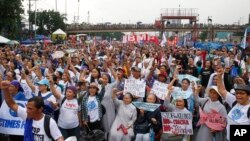Human Rights Watch on Wednesday released harrowing accounts of the drug war's impact on Filipino children.
The 48-page report outlines police killings of children, the bullying and stigma that drug users' children face, the psychological damage to those who have witnessed family members’ deaths, and the resulting poverty when parents and guardians are killed.
The HRW report followed similar ones by Amnesty International, which further detail the devastation of drugs.
Philippine President Rodrigo Duterte’s crackdown on the illegal drug trade began with his inauguration in June 2016. His anti-drug campaign garnered international attention when human rights advocates uncovered thousands of killings and extrajudicial executions by state forces and vigilante groups.
Within the first six months of Duterte’s presidency, more than 7,000 people believed to have been connected with the drug trade were killed — an average of 34 a day. Besides instructing law enforcement to rid the country of drugs, Duterte encouraged citizens to kill suspected drug dealers or users as a part of their “duty.”
Since then, Filipino activists have alleged that more than 27,000 people have been killed under Duterte, while the government said the number was closer to 6,600. Contrasting reports and increasing concerns prompted the U.N. Human Rights Council to launch an investigation into the killings in July 2019.
The Duterte administration’s drug crackdown has contributed to overcrowding in prisons, producing breeding grounds for coronavirus outbreaks. Eventual outbreaks in some of the Philippines’ jails forced the country to release nearly 10,000 inmates in early May.







